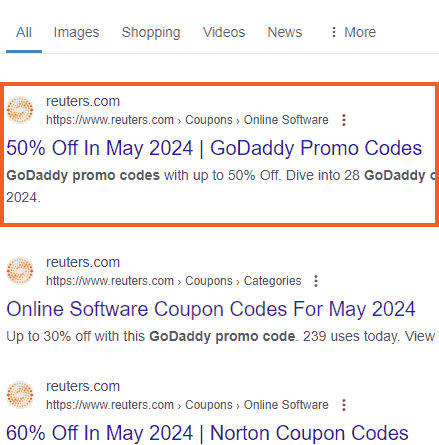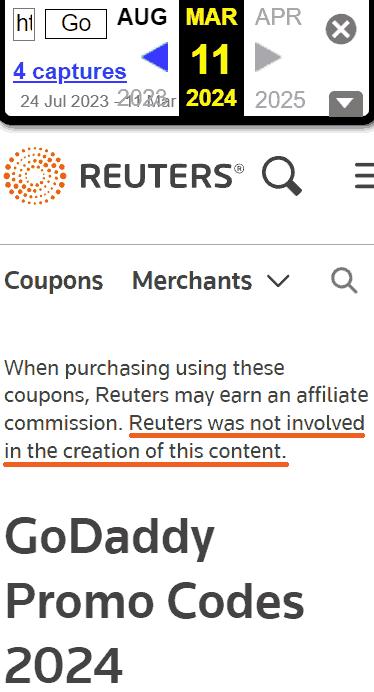
Google indicated that manual actions were reaching web pages that hosted third-party web pages, and according to some, the effects of these manual actions may be showing up in search results.
Site Reputation Abuse Manual Actions
Google’s SearchLiaison tweeted late on May 6 that Google was enforcing the new site reputation abuse policy with manual actions. Manual actions are when someone at Google inspects a web page to determine if the page violates a spam policy.
The reputation abuse policy affects sites that host third-party content that is published with little or no oversight from the hosting website. The purpose of the arrangement is for the third party to leverage the reputation of the host site so that both receive a share of affiliate sales. An example might be a news website that hosts coupon code content created entirely by a third party.
What are manual actions?
A manual action is when a Google human visually inspects a website to determine if it has violated Google’s spam policies. A manual action usually, but not always, results in removal from Google’s search index. Sometimes offending web pages are removed entirely, and sometimes they are just prevented from ranking.
Sites with manual actions
Google tells the site publisher if a site has received a manual action. Only the site editor and those with access to a website’s search console account can know. In general, Google does not announce which sites have received a manual action. Therefore, unless a site has completely disappeared from Google Search, it is not possible to say with any degree of certainty whether a site has received a manual action.
The fact that a web page has disappeared from Google search results is not confirmation that it has received a manual action, especially if other pages on the site can still be found.
It’s important to understand then that unless a website or Google publicly acknowledges a manual action, any outsider can only speculate whether a site has received one. The only exception is in the event that a site is completely removed from the search index, in which case there is a high probability that the site has been penalized.
Big brands have been removed from search results
You can’t say for sure that a site has received a manual action if the page is still in the search index. But Aleyda Solis noticed that some big brand websites have recently stopped ranking for coupon-related search queries.
Aleyda shared screenshots of the search results related to the coupon before and after the site’s abuse policies were applied. His tweets showed screenshots of sites that no longer ranked. Some of the sites appear to have removed their coupon web pages (highlighted in red), and sites that still hosted coupon pages but no longer ranked in search results were highlighted in orange in the screenshots ‘Aleyda.
It should be noted that Aleyda does not accuse any site of having received a manual action. It just shows that some sites no longer rank for coupon code search queries.
Aleyda he tweeted:
“Google has already started taking action for the new site reputation abuse policy 👀👇 Check out the before and after of many of the most popular “promo code(s)” queries:
* carhartt promotional code
* postmates promotional code
* Samsung promotional code
* godaddy promo code
Places that used to be classified and no longer are:
* On Orange (with coupon sections still in place): Cnet, Glamour, Reuters, USA Today, CNN, Business Insider
* In red (with coupon sections removed): LA Times, Time Magazine, Wired, Washington Post”
Did Reuters receive a manual action?
Global news agency Reuters used to rank #1 for the keyword phrase “GoDaddy promo code” (as seen in the “before” screenshot posted by Aleyda on Twitter).
But today Reuters is completely removed from search results.
Has the Reuters GoDaddy page received a manual action? Manual actions usually result in the complete removal of a web page from the Google search index, but this is not the case with the Reuters GoDaddy coupon page. A search of the GoDaddy coupon page site still shows that the Reuters web pages are still currently indexed by Google. It’s just not a ranking anymore.
Reuters coupon page continues in the search index
It’s hard to say for sure if the Reuters page received a manual action, but what is clear is that the page is no longer classified, as Aleyda correctly points out.
Did Reuters’ GoDaddy page violate Google’s spam policy?
Google’s Site Reputation Abuse Policy says that one characteristic of site reputation abuse is a lack of oversight of third-party content.
“Site reputation abuse is when third-party pages are posted with little or no oversight or involvement from the first party…”
Reuter’s current GoDaddy page contains a disclaimer stating that it monitors third-party content.
This is the current disclaimer:
“Reuters newsroom staff had no role in the production of this content. It was verified and vetted by the Reuters Plus coupon team, Reuters’ brand marketing studio, in partnership with Upfeat”.
Reuters’ disclaimer shows that there is first-party monitoring that Reuters is in full compliance with Google’s spam policy.
But there is a problem. There was a completely different disclaimer before the announcement of Google’s site reputation abuse policy. This raises the question of whether Reuters changed its disclaimer to give the appearance that there was oversight.
Fact: Reuters changed the disclaimer
The current disclaimer on the Reuters coupon page states that there was some oversight of third-party content. If this is true, Reuters complies with Google’s spam policy.
But as of March 11, 2024 and earlier, Reuters published a disclaimer clearly disclaiming involvement with third-party content.
Here’s what Google’s site reputation abuse policy says:
“Site reputation abuse is when third-party pages are posted with little or no oversight or involvement from the first party…”
And this is the March 11, 2024 disclaimer on the Reuters coupon page:
“Reuters was not involved in the creation of this content.”
Reuters previously denied monitoring third-party content

Reuters changed its disclaimer about a week after Google’s core update was announced. This disclaimer had always kept Reuters from participating before the announcement of Google’s spam policy.
Here’s their 2023 disclaimer on the same GoDaddy coupon page:
“This service is operated under license by Upfeat Media Inc. The retailers listed on this page are selected by Upfeat. Reuters newsroom is not involved.”
Why did this disclaimer change after the Google site reputation abuse announcement? If Reuters is infringing, did they get manual action but prevent those pages from being removed from Google’s search index?
Manual actions
Manual actions can result in the complete removal of the offending web page from Google’s search index. This is not what happened with Reuters and the other big brand coupon pages highlighted by Aleyda, so it could be possible that the big brand coupon pages just received a rank downgrade and not a complete de-indexing, as it’s common in common places. Or it could be that the decline of these pages in the ranking is a complete coincidence.
Featured image by Shutterstock/Mix and Match Studio
[ad_2]
Source link




